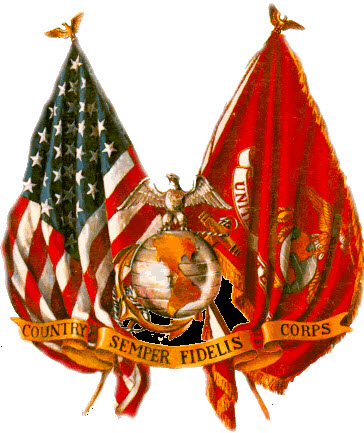 Tomorrow is Veterans Day but today is special too. Today we celebrate the 236th birthday of the United States Marines. Formed in 1775 to assist the U.S. Navy during the Revolutionary War to conduct ship-to-ship fighting, provide shipboard security and discipline enforcement, and assist in landing forces.
Tomorrow is Veterans Day but today is special too. Today we celebrate the 236th birthday of the United States Marines. Formed in 1775 to assist the U.S. Navy during the Revolutionary War to conduct ship-to-ship fighting, provide shipboard security and discipline enforcement, and assist in landing forces.
Throughout its long and storied history, the U.S. Marines have fought in every conflict in which we have been involved.
While many will today celebrate the Corps and recount their history, I have chosen to narrow the focus.
In honor of the entire U.S. Marine Corps, throughout history and those who serve with honor today, I want to draw your attention to a single unit. A mere 400 Marines who changed history and who are responsible for our freedoms today.
There aren’t many of them left and it wasn’t until recently that these Marines were formally recognized for their remarkable efforts but you should know who they were, what they did and who they are now.
They were more than U.S. Marines, they were the Navajo Code Talkers.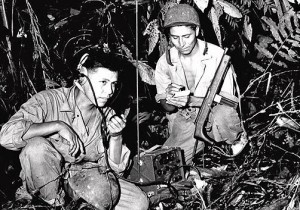
During WWII, in the pacific, our codes were being broken by the Japanese at an alarming rate. They, the Japanese, in those early months of the war, knew where we were going, what we were doing and they were actually changing our orders leading our fighting forces into harm’s way and ambushes. Nothing was working.
Enter the unsung hero, Phillip Johnston.
Johnston was not Navajo but he WAS the son of missionaries who grew up on a Navajo reservation. Johnston could speak the Navajo language and knew that outside the Navajo people, less than 3 dozen people in the world could do that.
Johnston recruited 29 Navajo men who could speak both their native language and English and those 29 men became United States Marines. It wasn’t known at the time, because on the reservation, birth certificates were not standard practice, but some of those “Original 29” were discovered later to be only 15 years old at the time. By age, they were boys, by deed, men.
The “Original 29” set the standard and the code from their native language which would, throughout the war, continue to be expanded and upgraded but it was that language, a langu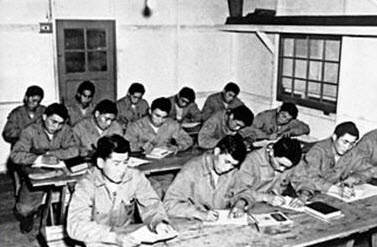 age without an alphabet that changed the course of history and the outcome of WWII in the Pacific.
age without an alphabet that changed the course of history and the outcome of WWII in the Pacific.
The Japanese code breakers had no idea what to what they were listening and not a clue as to what to do about it.
The Navajo language is so complex and so grammar specific that even on the reservation, between families, it can be hard to communicate and therefore, the “Original 29” literally wrote the book on it. That book, the Navajo code book was taught to all the Navajo Code Talkers who joined the Corps. It was memorized by the Code Talkers and the book itself was never allowed outside the classroom.
It should be noted that in Navajo, there are no words for most of what the military did then or now so, other words would be substituted rather than come up with any sort of direct translation. While the military talked of grenades, the Cod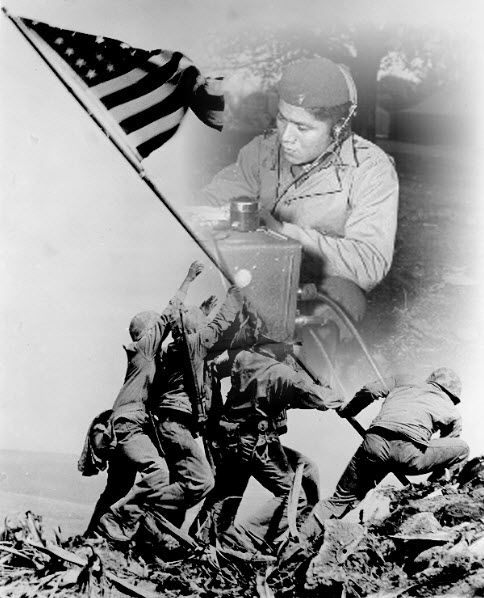 e Talkers spoke of…potatoes. Where the military spoke of tanks, the Code Talkers talked about turtles.
e Talkers spoke of…potatoes. Where the military spoke of tanks, the Code Talkers talked about turtles.
The Code Talkers knew what they were talking about but nobody else did.
How important were the Navajo Code Talkers in the Pacific theater?
On Iwo Jima, during the first days of that epic battle, 6 Navajo Code Talkers worked around the clock and in a language so complex that only they knew of what they spoke and more than 800 messages were sent and received without a single mistake. Later, Howard Connor, a Marine Major in charge of the 5th Division signal Corps at Iwo stated without hesitation, “Were it not for the Navajos, the Marines would never have taken Iwo Jima.”
By the end of WWII, there were some 400 Navajo Code talkers and in battle after battle, they not only sent and received coded messages, they also went through full Marine Corps training and performed, on the field of battle, all that was asked of any United States Marine.
These men were heroes.
Of the 400 Navajo who became Code Talkers during WWII, there are now but 4 left to tell their story.
Keith Little served as a Navajo Code Talker with the US Marine Corps from December of 1943 until after the war. He fought in 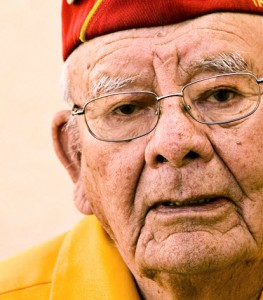 numerous engagements of WWII, including battles in the Marshall Islands, Sai Pan, and Iwo Jima. Like most of the Navajo Code Talkers, he wasn’t aware of the significance of his contribution to the war effort until much later in life. It was only then that he understood the importance of documenting their story for posterity. In conversation about his hopes for the new museum, he speaks with certitude of his desire to teach the younger generations of the importance of striving for excellence and of serving above and beyond the call of duty. Promoting a greater understanding of the Navajo culture, traditions and way of life is a cause he also holds dear. When asked why he chose to go to war, he answers simply: “[because] the Japanese made a sneak attack on the US,” adding that he wanted “to protect our people, land and country.”
numerous engagements of WWII, including battles in the Marshall Islands, Sai Pan, and Iwo Jima. Like most of the Navajo Code Talkers, he wasn’t aware of the significance of his contribution to the war effort until much later in life. It was only then that he understood the importance of documenting their story for posterity. In conversation about his hopes for the new museum, he speaks with certitude of his desire to teach the younger generations of the importance of striving for excellence and of serving above and beyond the call of duty. Promoting a greater understanding of the Navajo culture, traditions and way of life is a cause he also holds dear. When asked why he chose to go to war, he answers simply: “[because] the Japanese made a sneak attack on the US,” adding that he wanted “to protect our people, land and country.”
Teddy Draper Sr. joined the Marines on November 3rd, 1943, and was soon after sent overseas as a Navajo Code Talker serving in 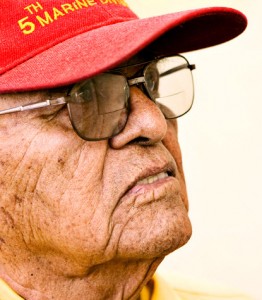 many harrowing campaigns. In the assault on Iwo Jima, he was wounded in the face and leg by mortar fire but continued to fight on with his comrades. He landed with the 28th Marines on Green Beach and, at one point, bravely ran through heavy enemy fire and back again to retrieve lost equipment needed to open lines of communication. It was a distinguished act for which he was promoted. Sadly, he lost many friends during this bloody struggle. Teddy Draper Sr. later went on to serve in occupied Japan, where he became proficient in his third language, which he still remembers today. He was discharged May 16th, 1946.
many harrowing campaigns. In the assault on Iwo Jima, he was wounded in the face and leg by mortar fire but continued to fight on with his comrades. He landed with the 28th Marines on Green Beach and, at one point, bravely ran through heavy enemy fire and back again to retrieve lost equipment needed to open lines of communication. It was a distinguished act for which he was promoted. Sadly, he lost many friends during this bloody struggle. Teddy Draper Sr. later went on to serve in occupied Japan, where he became proficient in his third language, which he still remembers today. He was discharged May 16th, 1946.
Bill Toledo was a Navajo Code Talker for three years from October 1942 to October 1945. He served in many engagements 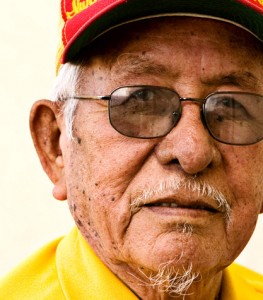 including the Battle of Bougainville in the British Solomon Islands, and the battles for Guam and Iwo Jima. On the island of Guam, while filling in as a messenger, he narrowly escaped sniper bullets by means of some quick footwork. Impressed by his moves, some of the Marines jokingly asked about his football career before the war. Not all Marines were so jovial, though. On one occasion, while marching through the jungle, he was mistaken for a Japanese soldier and taken prisoner. After being marched back to headquarters at gunpoint, he was assigned a bodyguard to avoid future misunderstandings. Although the danger is gone, he still gets calls to this day making sure he’s okay. Bill Toledo feels it is important to share experiences like his with new generations so that they may understand the cost of freedom and the sacrifices which were made on their behalf.
including the Battle of Bougainville in the British Solomon Islands, and the battles for Guam and Iwo Jima. On the island of Guam, while filling in as a messenger, he narrowly escaped sniper bullets by means of some quick footwork. Impressed by his moves, some of the Marines jokingly asked about his football career before the war. Not all Marines were so jovial, though. On one occasion, while marching through the jungle, he was mistaken for a Japanese soldier and taken prisoner. After being marched back to headquarters at gunpoint, he was assigned a bodyguard to avoid future misunderstandings. Although the danger is gone, he still gets calls to this day making sure he’s okay. Bill Toledo feels it is important to share experiences like his with new generations so that they may understand the cost of freedom and the sacrifices which were made on their behalf.
When Navajo Code Talker Samuel Tso saw the tiny island of Iwo Jima for the first time, he thought US forces would be able to take 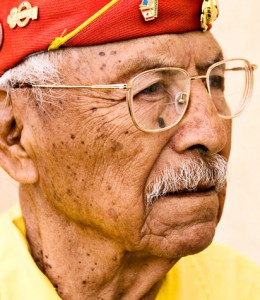 it in one day. Even as they landed, the beaches were dead quiet. Only after they had made their way up the beach did the heavily entrenched Japanese open fire. It was not long before the young Marine reconsidered his first assessment. It would take more than a month of brutal combat before the island was secured. Samuel Tso bravely served with the US Marine Corps from February 13th, 1943 to March 29th, 1946. Even now, some 65 years later, he recalls with clarity the experience of crouching in bomb craters for cover, unable to ascertain the direction of fire until comrades on the opposite side of the crater were killed. Hearing his experiences, it becomes quite clear why the Navajo Code Talkers Museum & Veterans’ Project is so meaningful to him. It will be a place where the Code Talkers can tell their own harrowing stories and help promote the cause of peace.
it in one day. Even as they landed, the beaches were dead quiet. Only after they had made their way up the beach did the heavily entrenched Japanese open fire. It was not long before the young Marine reconsidered his first assessment. It would take more than a month of brutal combat before the island was secured. Samuel Tso bravely served with the US Marine Corps from February 13th, 1943 to March 29th, 1946. Even now, some 65 years later, he recalls with clarity the experience of crouching in bomb craters for cover, unable to ascertain the direction of fire until comrades on the opposite side of the crater were killed. Hearing his experiences, it becomes quite clear why the Navajo Code Talkers Museum & Veterans’ Project is so meaningful to him. It will be a place where the Code Talkers can tell their own harrowing stories and help promote the cause of peace.
To this day, the only unbroken military code on earth is that which was spoken, sent and received by the Navajo Code Talkers.
The world didn’t know of the Code Talkers until their operations were declassified in 1968 and it took until 1982 before any official recognition was given them by President Reagan. In 2000, President Clinton signed into law, Public Law 106-554, 114 Statute 2763, which awarded the Congressional Gold Medal to twenty-nine World War II Navajo code talkers which were then 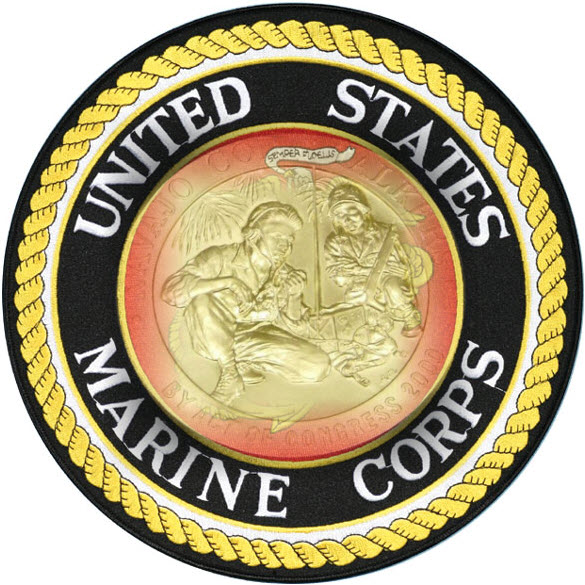 presented to 4 of the 5 living Code Talkers personally by President Bush in 2001. One of those living at the time was, because of health reasons, unable to attend that Washington D.C. event and the other 24 Medals were presented to the families of those who were no longer with us.
presented to 4 of the 5 living Code Talkers personally by President Bush in 2001. One of those living at the time was, because of health reasons, unable to attend that Washington D.C. event and the other 24 Medals were presented to the families of those who were no longer with us.
The honors and recognition were long overdue, well deserved and greatly appreciated by those men and by their families.
If you are a Marine, as you celebrate the Marine Corps’ 236th birthday today, I ask that you remember these Marines, the 400 who became Code Talkers during WWII and the 4 who remain with us today because beyond any formal honor or citation which can be given, that they not be forgotten is perhaps the greatest honor we, as Americans, could possibly bestow.
Happy Birthday Marines, Semper Fi, and thank you for what you do and for what you have given this nation.
To learn more about these Heroes, please visit their website by clicking here.





And we remember the 241 Marines murdered as they slept, in Beirut in October, 1983…by Hizbullah/Iran/Syria. May They Rest in Peace.